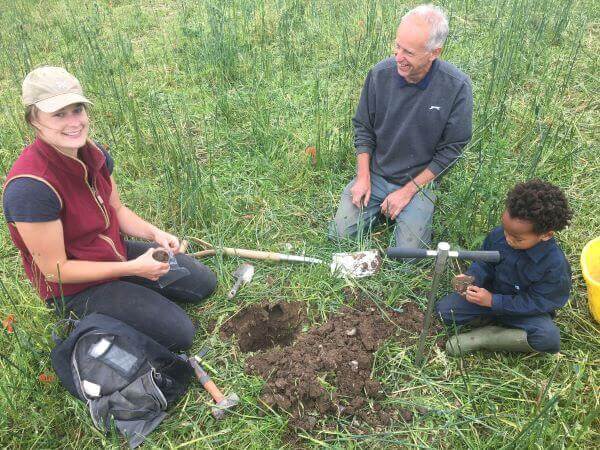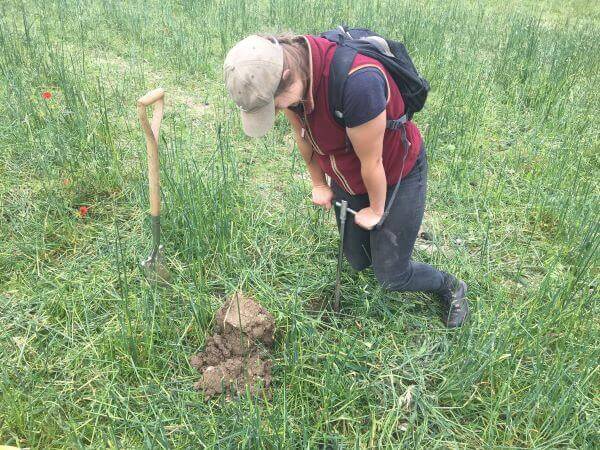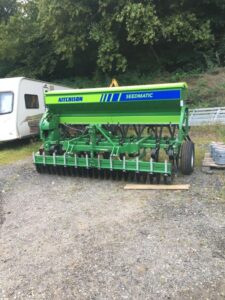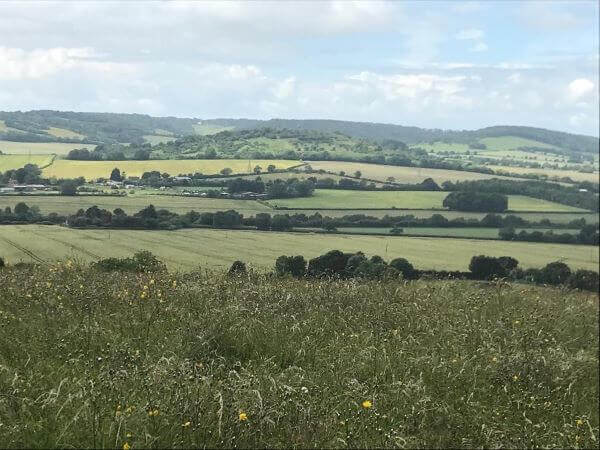
Trees, Hedgerows and Healthy Soils: Chilterns farmers tackling their Carbon Footprint
COP26 – the 26th United Nations Climate Change Conference, a crucial event for tackling the climate crisis – has recently finished in Glasgow. Even after global leaders left, intense negotiations took place until 12th November to try to agree on the best measures to cut global carbon emissions, to keep global temperature rises to below 1.5 degrees celsius.
You may have read about world leaders agreeing a deal to end deforestation. Deforestation is a major contributor to human-caused greenhouse gas emissions. This is because trees capture carbon dioxide from the atmosphere when growing, so deforestation removes an important carbon ‘sink’ that offsets carbon emissions.
In the Chilterns we have almost 24% woodland cover, three times the national average for England. 56% of all woodland in the Chilterns is ancient woodland (recorded as having continuous tree cover for over 400 years). See the 2019-2024 Chilterns Management Plan. LP8
So, we are already making a significant contribution to the nation’s tree cover, but could we do more? Yes, and we are working with landowners and other agencies to support tree planting, following the golden rule: ‘the right tree in the right place’.
It’s not just trees in woodland that make a vital contribution to the Chilterns AONB’s carbon sequestration. Our hedgerows and hedgerow trees, vital features of our beautiful landscape, are increasingly being recognised for their ability to store carbon.
(Hedgerow trees, in landscape terms, are plants specifically planted to grow on as mature trees, or mature trees within a hedgerow. The AONB management plan estimates that we have 44,000 hedgerow trees across the AONB (CCB Hedgerow Survey 2006-8?) and should be replacing these at 500-1,00 per year just to maintain numbers. See the 2019-2024 Chilterns Management Plan, LP6)

A newly planted hedgerow
The Heritage Lottery Funded Chalk, Cherries and Chairs project has been running for two years now, and so far tree-planting achievements include:
- Planting over 50,000 new hedgerow trees.
- Planting or improving 13.5 kilometres of hedgerow. (Improved, thicker hedgerow captures more carbon and also makes a better habitat for hedgerow wildlife).

Working with farmers and landowners has been key to achieving this.
Trees are not only carbon sinks, capturing carbon from the atmosphere, they also help to regulate temperature (particularly in urban areas), help purify and store water and reduce flood risks. However, other natural wildlife habitats can also sequester carbon, such as healthy soils, chalk grasslands and even, the humble pond.
The Farm Carbon Project
The Central Chilterns Farmer Cluster is a group from 18 farms in the Chilterns who work together to support nature and wildlife on their farms. As well as participating in the hedgerow and tree planting above, they’ve recently been working proactively to reduce the carbon footprint of their farming practises.
With support from the Rothschild Foundation and the Heritage Lottery Fund, each farm has carried out a farm carbon self-assessment, using a farm carbon toolkit (add link Home – Farm Carbon Toolkit). With the assessments now complete, the farmers are about to meet to discuss practical steps to reduce their farms’ carbon footprint.

Soil Sampling
Ploughing causes one of the biggest losses of soil carbon into the atmosphere and so the farmers are looking at ways to reduce the amount of ploughing needed.

A seed drill
Some of the farms have recently started direct drilling their seed, which reduces the need for ploughing by enabling farmers to sow seeds direct into the ground. One farmer commented that using direct drilling has reduced the number of tractor passes or journeys he makes across fields in a year by 60 – 70% – greatly reducing both soil carbon emissions and diesel fuel use. Members of the cluster are also taking measures such as planting winter ground cover crops instead of leaving soil bare, which reduce water run-off, soil erosion and sedimentation of our rivers. Improving soil health by building organic matter creates an effective carbon sink and decreases the need for artificial fertilisers which reduces water pollution.
All of this will have a gradual effect of reducing carbon emissions over years, bringing the farms closer to net zero farming. The Chilterns Farmers Cluster covers 6500 hectares of land in Buckinghamshire, and a second cluster, The Christmas Common Farmer Cluster in Oxfordshire, is taking similar steps. The two clusters combined will improve the carbon footprint of c. 15,000 hectares of land, making a real impact on the Chilterns.
The Chilterns Conservation Board supports the Central Chilterns Farmer Cluster project through linking the farmers up with expertise, sourcing the training needed, and helping the cluster to obtain funding. We help make the projects happen – but it’s the farmers themselves who drive the projects forwards and are keen to look after their land in this way.
We’ve also been supporting farmers with chalk grassland management. Unimproved chalk grassland has an important role to play in carbon sequestration and storage. We’ve supported farmers with the clearance of scrub that shades chalk grasslands, and two farmers are setting up ‘mob’ cattle grazing– a planned grazing rotation that positively supports the growth of wildflowers and other chalk grassland plants. Chalk grasslands are a fantastic habitat for bees and butterflies, which are a sign of a healthy environment.

Watch the Video
Watch the video about conservation work taking place at the chalk grassland at Lodge Farm.

Outstanding Chilterns Magazine
Read more about grazing in the Chilterns on page 18 of our online Outstanding Chilterns Magazine, and read more about the work of the Central Chilterns Farmer Cluster on page 12.
Related news
Bluebells: the sign of spring in the Chilterns
Bluebells flower in abundance in ancient woodland in early spring and are found throughout the Chilterns.
Calling all artists: new national arts programme
We are seeking writers and artists to take part in Nature Calling – a new national arts programme.
Revitalising the Hamble Brook
For the first time in more than 140 years, the Hamble Brook has a new wetland site.





